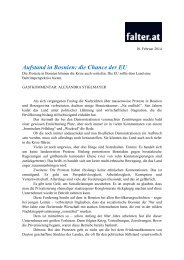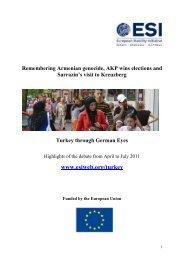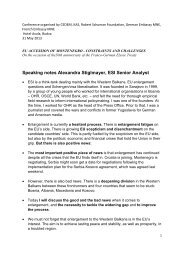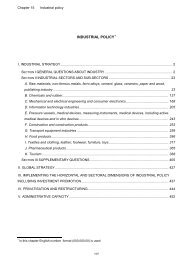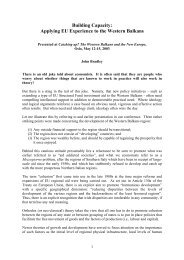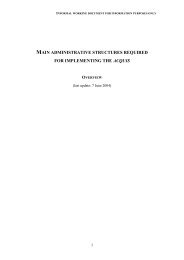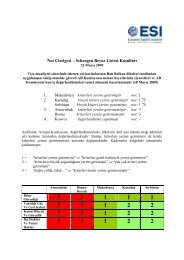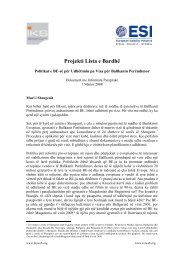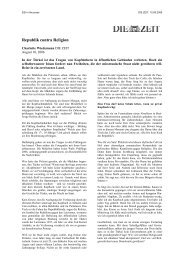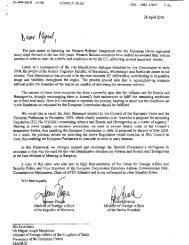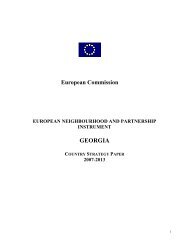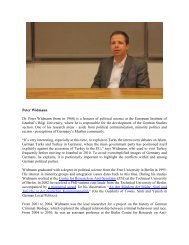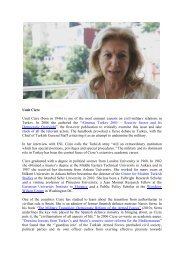MURDER IN ANATOLIA - European Stability Initiative - ESI
MURDER IN ANATOLIA - European Stability Initiative - ESI
MURDER IN ANATOLIA - European Stability Initiative - ESI
You also want an ePaper? Increase the reach of your titles
YUMPU automatically turns print PDFs into web optimized ePapers that Google loves.
– 7 –<br />
against the Refah (Welfare) Party, which ended in the party‟s closure. 39 In 2007, on the eve<br />
of another closure case – this time, against the governing AKP – he wrote Children of Moses:<br />
Tayyip and Emine (“Musa‟nin Cocuklari: Tayyip ve Emine”), a bestseller about Prime<br />
Minister Tayyip Erdogan and the supposed threat to Turkey posed by his party (and his wife,<br />
Emine, who is wearing a headscarf). 40 Poyraz accused Erdogan and his conservative allies of<br />
being crypto-Jews with secret ties to the conspiratorial forces of “global Zionism.” 41<br />
In his 2001 book on missionaries, Poyraz spins a familiar nationalist tale: how Western<br />
missionaries instigated the Ottoman Armenians to rise up against the Turks during World<br />
War I; how later, in the 1980s, Christian missionaries again “reached out to the Kurds and<br />
instigated them to rebel.” 42 As to what now made the missionaries so dangerous, Poyraz is<br />
explicit: “the most important reason why the missionaries have been given limitless freedom<br />
in their activities is the <strong>European</strong> Union.” 43 He adds, “As you know, the West has not<br />
digested that the Turks conquered Istanbul and eliminated Byzantium, because Istanbul and<br />
Anatolia are holy lands for Christians.” 44 In the 1920s, Poyraz notes, Turkey was led by<br />
Ataturk and was able to defend itself against the Western powers‟ plans to split up Turkey<br />
through the Treaty of Sevres. 45 Today, warns Poyraz, Turks must get ready for a new anticolonial<br />
battle. He concludes his book with a threat,<br />
“I think it is useful to remind the missionaries of the following: This land has been<br />
Turkish for thousands of years. Its price was paid with blood. Those dreaming of getting<br />
back these lands should foresee paying that price.” 46<br />
Poyraz‟s analysis was picked up in 2001 by the National Security Council (NSC), at the time<br />
widely considered the most powerful institution in Turkey. The NSC‟s Secretary General was<br />
General Tuncer Kilinc, one of the most outspoken opponents of Turkey‟s EU aspirations,<br />
who repeatedly and publicly accused the EU of working on dividing Turkey and supporting<br />
Kurdish terrorists to this end. In December 2001 an article in the daily Sabah, under the title<br />
“Missionary Alarm”, refered to a special report prepared for a meeting of the National<br />
Security Council:<br />
“Missionary activities were put on the December meeting agenda of the National<br />
Security Council. A report prepared for the NSC warned that the real goal of missionary<br />
Kanla Abdest Alanlar (March 2007), Patlak Ampul (March 2007), Musa’nin Gulu (2007), From the Kaliphate’s<br />
Army to the Arab Kurdish Party (Hilafet Ordusundan Arap Kurt Partisine, 2005).<br />
39<br />
Refah (Welfare) became the largest party under Prime Minister Necmettin Erbakan in 1996. However, the<br />
coalition government was forced out of power by the Turkish military in 1997, due to being suspected of having<br />
an Islamist agenda.<br />
40<br />
Mustafa Akyol, “The Latest Jewish Conspiracy: „Moderate Islam‟ & AKP”, The White Path, 5 May 2007,<br />
http://thewhitepath.com/unveiling-turkey/the_latest_jewish_conspiracy_moderate_islam_akp/.<br />
41<br />
Poyraz‟ latest book, published in August 2010, is omnipresent in Turkey‟s bookshops in November 2010:<br />
Takunyali Fuhrer (Reactionary Fuhrer), whose cover shows Erdogan as Adolf Hitler.<br />
42<br />
Ergun Poyraz, Misyonerler arasinda alti ay: dunden bugune Hiristiyanlik ve Yahudilerin analizi [Six months<br />
among the missionaries], Toplumsal Donusum Yayinlari, Istanbul 2004, p. 31.<br />
43<br />
Ibid, p. 38.<br />
44<br />
Ibid, p. 204.<br />
45<br />
The Treaty of Sevres, signed by the defeated Ottoman government after World War I in 1920, saw Anatolia<br />
split up into different territories controlled by different allies – Greece, England, France and Italy – as well as an<br />
independent large Armenia and an autonomous Kurdish region.<br />
46<br />
Ergun Poyraz, Misyonerler arasinda alti ay: dunden bugune Hiristiyanlik ve Yahudilerin analizi [Six months<br />
among the missionaries], Toplumsal Donusum Yayinlari, Istanbul 2004, p. 448.<br />
~ www.esiweb.org ~



